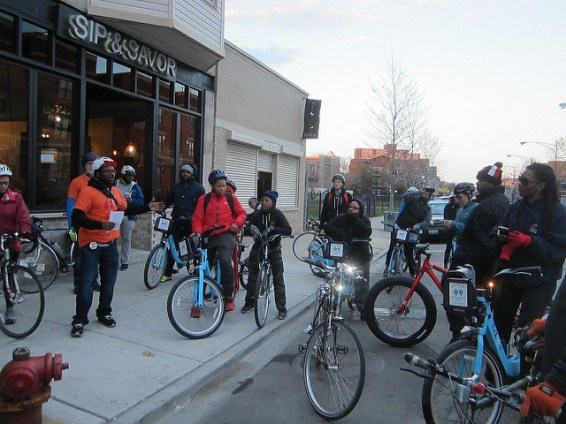Attendees at last Thursday's Mayor's Bicycle Advisory Council meeting voiced some reservations about the recently unveiled deal between the city of Chicago and Divvy concessionnaire Lyft/Motivate. The proposed contract amendment would nearly triple the Divvy fleet, electrify it, and expand it citywide, but it would also officially give the ride-share company a monopoly on local bike-share.
As we reported last week, the city is looking to amend its existing contract with Lyft, which bought Motivate, Divvy's operator last summer. The move would expand the system to all 50 wards by 2021, adding 10,500 bikes and 175 stations. That would bring the total to about 16,500 bikes and 800 stations. All of the new Chicago bikes would be electric pedal-assist cycles and have hybrid locking capabilities, so they could be locked at a station or to a regular bike rack. In return, Lyft would replace Blue Cross Blue Shied of Illinois as the system sponsor, so the Lyft logo would take the place of the Blue Cross logo on all the bikes, making them rolling ads for a ride-share service.
During Thursday's meeting, CDOT assistant commissioner Sean Wiedel said City Council's Committee on Pedestrian and Traffic Safety's is expected to vote on the deal at its April meeting. While the exact date of the committee hearing hasn't been scheduled yet, Wiedel said it should take place in time for the full City Council to vote on the deal at its April 10 meeting if it passes the committee.
Wiedel touted the proposed changes as being a major win for Chicago. “Every other bike sharing deal in the country, quite frankly, pales in comparison,” he said
Long-time Lincoln Park community activist Allan Mellis asked Lyft officials in attendance why they decided to buy a bike-sharing company in the first place. Miller Nuttle, the company's senior manager of bike and pedestrian policy, responded that it made sense from a sheer logistical standpoint. “There’s a pretty significant chunk of our ride-sharing trips that’s under two miles,” he said. “It would be better for our customers, it would be better for the city if those trips were on a bike.”
On the other hand, shifting such trips from ride-share to bike-share might not be good for the Lyft's bottom line. Lyft gets a cut of every car trip fare, whereas many Divvy trips are made by annual members, who can take as many 45-minute trips as they like for free.
Mellis also asked whether three-wheel bikes would be part of the expansion. Wiedel said that CDOT and Lyft will be working with the disability rights group Access Living to determine out where and how they could roll out an adaptive bike-share program. He said they hope to have something up and running by 2020.
Some attendees raised concerns that the expansion could fail to benefit many people in the city's poorest neighborhoods, if community outreach isn't improved. Dan Black, who was previously employed a Divvy outreach worker, as well as community engagement lead at JUMP Bikes (owned by Lyft competitor Uber) and a project coordinator at Slow Roll Chicago, implored Lyft to do more outreach about options for Chicagoans who lack credit cards or mobile devices, which are usually needed to access the system. “If we’re not addressing this, then we’re repeating some of the mistakes [that led to] where Divvy is now,” he said. Black added that he hopes community organizations that help educate residents about using bike-share and ride-share would receive some financial compensation for their work.
In response Amanda Woodall, the director of the Divvy for Everyone program, which offers $5 annual memberships to low-income and unbanked Chicagoans, promised that additional outreach education would be a major priority as part of the expansion.




